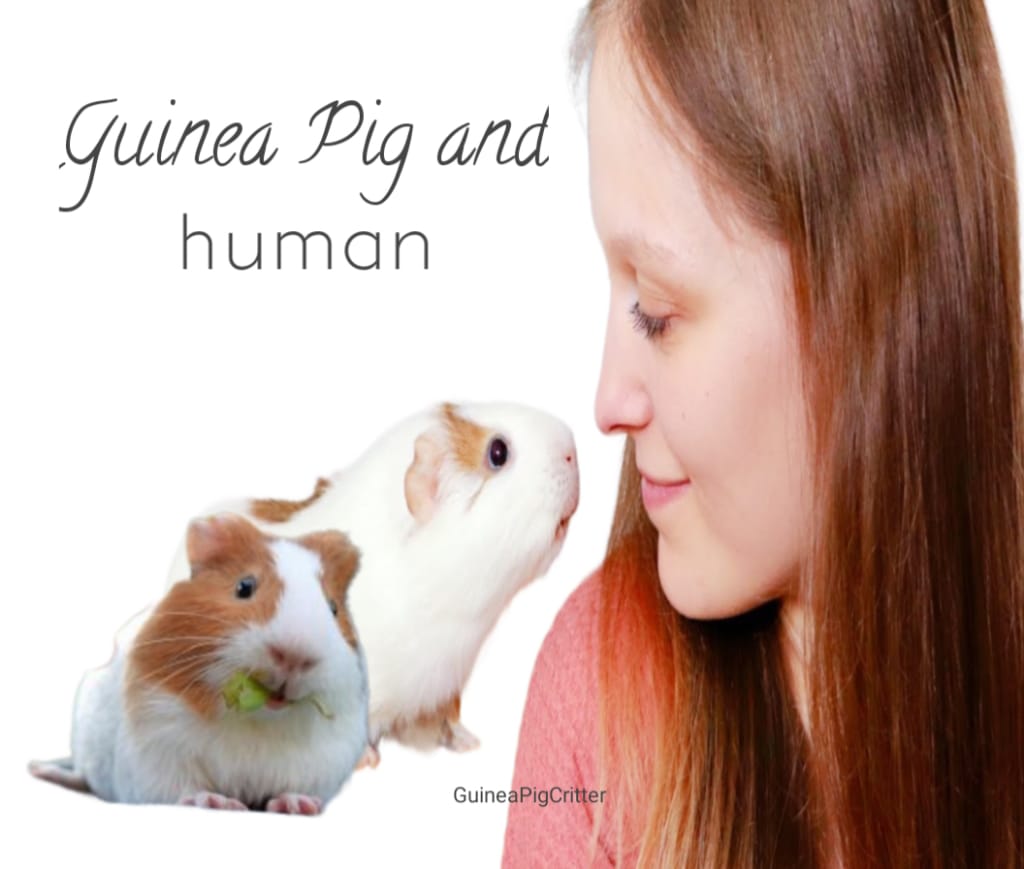The guinea pig, also known as the cavy, is a domesticated rodent that has been kept as a pet for ages. Many families find them the perfect companion because of their tender character, interesting habits and minimal requirements in terms of taking care for them.
Their playful antics and adorable squeaks bring joy to any home. But what does it take for guinea pigs and humans to live together successfully? This guide will explore the details involved in making an environment where both species can coexist harmoniously, thus ensuring a satisfying and happy life.
Throughout this comprehensive guide we will analyze if guinea pigs can coexist with human beings; it will cover everything ranging from the benefits of keeping them together to problems you may face and provides tips on how to stay in peace with each other within a household.
Read also this :-What Do Guinea Pigs Need in Their Cage?
What you need to know about guinea pigs
Basic characteristics and behaviors
Guinea pigs are small, herbivorous rodents. They have nice temperaments and unique ways of speaking that they use for interacting with their owners or themselves. Understanding such natural behaviors as chewing, burrowing or socializing is essential when offering an environment that stimulates them mentally.
The social nature and companionship need
Guinea pigs, unlike a number of other small animals, are extremely social creatures. They require human attention as well as that of their fellow guinea pigs. It is very important to recognize this social requirement and see to it that they get enough company so as not to fall into depression resulting from loneliness.
Typical living environment and space requirements
A guinea pig needs a big, safe enclosure that allows freedom of expression in terms of natural behaviors. A well-designed cage with enough space for movement, hiding and exploration is essential for their welfare. We will discuss the perfect setup to make your guinea pig have the most comfortable and stimulating environment.
Benefits of living with guinea pigs
Emotional support and companionship
Guinea pigs can be great companions. Their presence alone can offer emotional support while diminishing one’s feelings of isolation. Slow-paced manners and responsiveness create a strong bond which consequently makes pet owners eminently happy.
Low-maintenance pet option
In comparison with some other pets, guinea pigs are relatively easy-to-care-for animals. There is no need for extensive grooming or training them; besides, their dietary requirements are simple too. This makes them a suitable selection for busy people or households in general.
Children and grown-ups’ educational opportunities.
Having a guinea pig can be experience worth having educationally, which in turn develops a sense of responsibility, empathy and proper care for animals. Guinea pigs make good first time pets for children.
Stress relief and mental health benefits
A guinea pig has a calming effect that helps ease stress and anxiety. Each one’s cute behavior as well as the daily routine of looking after them all contribute to their sense of purpose and structure thereby leading to general mental wellbeing.

Creating a safe and comfortable living space
Choosing the right cage or habitat
The first step towards ensuring your guinea pig is comfortable is selecting an appropriate cage. The cage should not restrict you pet’s movements; it should be spacious enough to permit this. Wire cages with solid floors are highly recommended as they allow free circulation of air throughout the cage thus there is less risk to your pet’s feet being hurt.
Ensuring ample space for movement and exercise
There must be enough space available to allow the guinea pigs move around freely. Otherwise, obesity may result from very small cages among other problems associated with ill health. Incorporation of tunnels, ramps, as well as hiding spots can facilitate physical activity while at the same time provide mental stimulation.
Safe and appropriate bedding materials
The kind of material used as bedding is quite significant for your guinea pig’s health. Hence, it is advised that cedar or pine shavings be avoided since they can cause difficulties in breathing. Instead, you should go for paper-based bedding or comfortable aspen shavings.
Regular cleaning and maintenance
When considering the well-being of a guinea pig, maintaining cleanliness in its habitat is very important. Remove soiled beddings regularly and droppings and clean the cage thoroughly at least once a week. This prevents accumulation of harmful bacteria hence ensuring an environment that is hygienically safe.
Diet and nutrition
Essential dietary needs of guinea pigs
For example, guinea pigs have particular dietary requirements which need to be met in order to maintain their health. Hay must always be available because it helps digestion process and keeps teeth fit.
Safe foods and treats for guinea pigs
Besides hay, guinea pigs should consume fresh vegetables a little amount of high-quality pellets. Leafy greens like romaine lettuce, bell peppers, and cucumbers are good options. However treats should be given sparingly and healthy alternatives such as small pieces of fruit.
Foods to evade
Few foods are bad for guinea pigs and should be steered clear of. These contain chocolates, onions, garlic as well as iceberg lettuce. Always look into any new food before you give it to your guinea pig’s mouth.
The importance of fresh water and hay
Access to clean water is important. To maintain cleanliness of the water and prevent spilling, use a sipper-tubed water bottle. Fresh hay should always be there since it constitutes an essential part of their diet and helps in maintaining dental health.
Interaction and bonding
How to properly handle and interact with guinea pigs
Trust building together with injury prevention depends on proper handling for your guinea pig. Always ensure that you hold the main mass of their body while averting jerking movements. In order to cement partnership ties, set aside some moments daily to interact with your pet.
Building trust and bonding with your guinea pig
It takes time as well patience in building trust. Start by whispering close to its cage until they get used to sitting near them quietly. Eventually offer food through your hands as a means of touching them gently. Finally, they will feel safe when they grow more confident in you over time.
Establishing boundaries
There are different personalities and preferences for guinea pigs. You need to know when they want space, and not impose interaction on them. This will enable the development of trust and love.
Health and wellness
Common health issues in guinea pigs
For instance, respiratory infections, dental problems or skin conditions can easily affect guinea pigs. It is important to be aware of the signs of sickness in order to prevent any emergency cases.
Regular health check-ups and signs of illness
Early detection is necessary for regular veterinary check-ups. It is important to know when your pet is unwell, such as changes in appetite, unusual behaviors or just being lethargic; this will guarantee prompt medical services.
Preventive care and grooming tips
Grooming including cutting nails as well as the occasional baths should be done regularly so that your guinea pig’s health is maintained. Observe if there are pests on their fur or if they have any injuries on their skin.
Finding a qualified veterinarian
Not all vets are used to taking care of guinea pigs. To ensure that you get someone who understands the requirements of these types of animals more specifically one must look for one who specializes in exotic pets.

Potential challenges and solutions
Allergy of guinea pigs or their bedding
Some people may be allergic to guinea pigs or their bedding. Using hypoallergenic beddings and maintaining cleanliness in the living area can help to reduce allergens. If allergy persists, it is better to consult with a healthcare provider.
Managing noise and activity levels
Although they are quiet animals, guinea pigs tend to be quite active as well as noisy during feeding time especially. Therefore, providing them with toys and making their habitats comfortable will help control their activity levels and also minimize noise generated.
Behavioral problems and training
Biting cage bars and chewing on cages are some of the undesirable behaviors shown by guinea pigs. To mitigate these issues, discover the main cause behind such behaviors while offering appropriate outlets for natural instincts in them.
Making sure your guinea pig is safe around other animals
If you have other pets, make sure your guinea pig is safe. When needed, watch over interactions and provide separate dwellings. Always acquaint new pets slowly monitoring their behavior from time to time.
Check also this :-Why does my cat like my guinea pig?
Legal and ethical considerations
Understanding local regulations and laws regarding guinea pig ownership
Before acquiring a guinea pig, study local regulations concerning pet ownership so that you know what is required by law. Some places may have specific requirements or restrictions on keeping.
Ethical reflections on guinea pig care and breeding
Having an understanding of the ethical implications of breeding and care is a part of being a responsible pet owner. Avoid buying guinea pigs from unethical breeders, consider adopting them from shelters or rescue organizations.
Adoption vs. Buying from breeders
A compassionate choice would involve adopting a guinea pig from an animal shelter or rescue organization in order to reduce the number of unwanted pets. If you opt to buy one, ensure that the breeder is genuine and has animals’ welfare as their top priority.
Frequently asked questions (FAQs)
Can guinea pigs be left alone during the day?
Yes, but ensure they have food, water, toys, activities and safety when you’re not there. They should keep themselves busy with toys and other fun things.
How much time should i spend with my guinea pig daily?
An hour spent with your guinea pig every day can go a long way in building trust between you and it making it happy. It may include holding him/her or even playing with her softly.
Is it safe to let my guinea pig roam freely in the house?
Guinea pigs, while supervised, can be allowed outside their cage in a safe and enclosed space. Make sure there are no hazards like electric wires or tiny crevices that the guinea pig can become trapped.
What should I do if my guinea pig is not getting along with other pets?
Separate living quarters for each pet and monitoring of interactions is recommended if your guinea pig doesn’t get along with other pets. Consultation with a veterinarian or animal behaviorist would be helpful in managing this situation.
Can guinea pigs be trained to use a litter box?
The answer is yes! Put their box at one corner of their house where they usually pee & use different kind bedding to make them differentiate it from the rest of the cage.
Conclusion
The experience of living with guinea pigs cannot be described in words. A person will never have problems with his/her guinea pig if he/she understands its needs and provides a safe, loving atmosphere.
Whether you’re just starting out as an owner or you’ve had experience looking after guinea pigs before, this guide has some invaluable information on how to have a great time together with your little friend.


